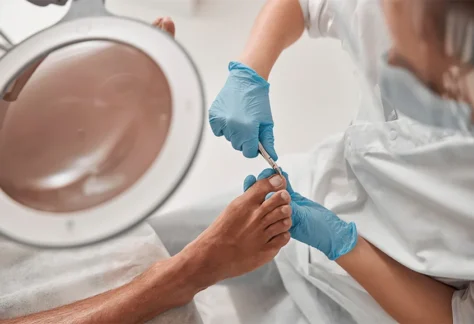In This Article:
- Research refers to clinical trials, studies and data. Online research is not research — it is the interpretation of research results.
- The COVID-19 vaccine and its booster shot have proven to be effective in preventing the spread of the virus and its variants.
- The vast majority of COVID hospital patients are unvaccinated. When ICU rooms are occupied by an influx of these patients, those suffering from other emergencies can’t get the care they need.
With new variants like omicron emerging, it’s clear that COVID-19 will carry over into the new year. Now more than ever, it’s crucial to get your vaccine booster — and your first two shots, if you haven’t already.
The vaccine is a safe, effective and accessible solution that’s proven to slow the spread of COVID-19 and its variants. More than 60% of Americans have received at least one dose. The booster, which is currently outpacing first and second dose shots, reminds your immune system to defend against the virus.
If you’re hesitant about the vaccine or booster shot but want COVID-19 to end, we’re here to help you make an informed decision. Let’s first explore the true definition of research to help you identify
trustworthy sources going forward.
Redefining “Research”
With endless information at our fingertips, it can be hard to know what research really means. Looking something up on Google, for example, is not research. Research is comprised of clinical trials, studies and data that people who aren’t doctors or scientists would have trouble understanding on their own. Medicine is like its own coded language. If you don’t have a medical background, detailed research findings won’t be valuable to you unless an expert simplifies them.
Therefore, online research is not research — it is the interpretation of research results. Only sources from certified institutions with a team that studies medical journals for a living should be considered credible. For example, the Center for Disease Control (CDC), Arizona Department of Health Services (AZDHS) and Journal of the American Medical Association (JAMA) provide lots of evidence-based information.
Now, let’s explore five reasons why you should get the vaccine and booster shot based on real research.
Reason 1: Vaccine Boosters Help Stop COVID-19 Variants
If you’re wondering why variants keep popping up left and right, it’s because viruses have one goal: to replicate and spread. If you don’t stop a virus in its tracks, it will inevitably mutate. Having a large pool of unvaccinated bodies to infect puts COVID-19 is in a great position to continue evolving.
It’s much harder for the virus to replicate in vaccinated people because it usually gets killed off before it has the chance. According to multiple clinical studies, the spread of the delta and omicron variants are largely due to unvaccinated populations giving the virus more opportunities to adapt, mutate and spread.
If enough people don’t get vaccinated, we may ultimately reach a point where the mutated virus isn’t even recognized by the original vaccine or booster. This would send us right back to square one; mask mandates, quarantine and all.
Reason 2: The Shot Is Effective
On the bright side, vaccines are working. With more than 8 billion doses administered around the world, we now have a realistic idea of how they can help us. These vaccines are designed to ensure we don’t crowd hospitals, contract severe symptoms and die. If you do get COVID-19 when vaccinated, it will likely be a mild issue that can be treated at home, like the flu. Given this expectation — and not one that assumes the vaccine will instantly wipe out the virus — it’s doing its job quite well.
Keep in mind that the states with the most vaccinated citizens also have the least number of cases.
Reason 3: Hospitals Are Understaffed and Overflowing
The vast majority of COVID hospital patients are unvaccinated. Fully vaccinated people have accounted for only 5% of cases, 7% of hospitalizations and 8% of deaths so far. This number will continue to decrease as more booster shots are administered.
When ICU rooms are occupied by an influx of COVID patients, those suffering from other emergencies — like heart attacks, strokes and trauma — can’t get the timely care they need. Additionally, many health care professionals have quit their jobs due to burnout, leaving many hospitals short-staffed. More widespread adoption of the vaccine and booster can help relieve some of the pressure falling on the shoulders of health care workers and the overtaxed hospital system.
Reason 4: Avoid Long-Lasting Effects from COVID
While many are worried about the long-term effects of the vaccine, medical professionals have found far more evidence regarding the long-term effects of COVID itself. Here are some very real symptoms that, although rare, should be a greater cause for concern:
- Persistent loss of taste or smell
- Organ damage or failure in the lung, kidney, heart or brain
- Memory loss
- Sleep disorders
- Depression and anxiety
- Chronic cough and chest pain
Historically, we have never seen side effects appear more than a few weeks after any vaccine. Doctors
have already found real evidence of COVID complications, though. As with any medication, there is always a small risk. However, the lasting symptoms of the virus far outweigh your risk of vaccine or booster side effects. It’s okay to have concerns, but talk to your doctor first to put things in perspective.
Reason 5: Protect Your Community
One of the most important things to remember as a society is that the vaccine is bigger than any one of us. A single person might not stop the spread of a variant, but 1,000,000 more doses certainly would.
Remember, it’s not about you alone — it’s about the well-being of your community, your country and your planet. Simply put, it’s the right thing to do.
The more people who get their vaccines and booster shots, the less the virus will mutate and spread. A vaccinated world would guarantee a future filled with sports, concerts, festivals, family gatherings and “normal” life as we know it. So, what are you waiting for? Book your vaccine booster today!
Sources:
- https://www.bloomberg.com/graphics/covid-vaccine-tracker-global-distribution/
- https://www.npr.org/sections/health-shots/2021/01/28/960901166/how-is-the-covid-19-vaccination-campaign-going-in-your-state
- https://jamanetwork.com/journals/jama/fullarticle/2786039
- https://systems.jhu.edu/research/public-health/covid-19-vaccine/
- https://www.cdc.gov/mmwr/volumes/70/wr/mm7037e1.htm
- https://www.health.qld.gov.au/news-events/news/long-term-effects-of-vaccines
- https://www.tandfonline.com/doi/full/10.1080/22221751.2020.1825914






